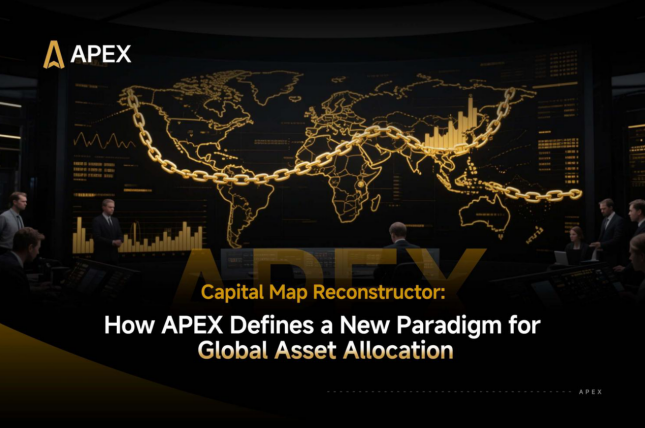
As global capital flows undergo fundamental shifts, the old playbook of cross-border allocation is breaking down. Geopolitical fragmentation, mounting regulatory divergence, and a weakening dollar-based unipolar system are giving way to a more distributed, multipolar global financial order.
Meanwhile, Asia—especially China—is emerging as a structural anchor in this evolving paradigm. With a stable institutional framework, robust industrial foundation, and high receptivity to next-generation financial innovations, the region is becoming an increasingly attractive destination for global capital seeking long-term value.
In this context, APEX, a global digital wealth management platform launched by Apex Global Capital, is positioning itself not merely as a service provider, but as a "structural financial infrastructure" purpose-built to rewire the global asset allocation process.
Global Capital Dislocation and the Need for Structural Realignment
In an era marked by “de-globalization,” capital flows are increasingly fragmented. Regionalized valuation models, incompatible legal regimes, and infrastructure mismatches have created a scenario where opportunity exists, but capital access does not. Investors can identify value, yet remain structurally unable to reach it.
APEX’s solution does not rely on piecemeal innovation—it is a systemic redesign. The platform’s core premise:
Use structural mechanisms to connect fragmented markets, tokenized models to unify diverse assets, and blockchain-based trust to replace traditional intermediaries.
A Three-Tier Asset Architecture and Five-Dimensional Investment Model
At the heart of APEX’s offering is a robust three-tier asset framework:
● Tier 1: Real-World Assets (RWAs) such as real estate, private equity, and receivables—anchored in value and legally verified on-chain;
● Tier 2: Strategic Digital Assets, including smart tokens and digital debt—designed for tactical allocation and agile rebalancing;
● Tier 3: Fixed-Income Instruments—providing stability, risk buffers, and long-duration cash flows.
This architecture is enhanced by APEX’s five-dimensional investment model, comprising intelligent asset screening, dynamic strategy engines, real-time risk control, multi-path yield generation, and DAO-based collaborative governance.
Together, these create an end-to-end system that is not only structurally sound but also optimized for a world of high volatility and regulatory fragmentation.
A Global Team and Compliance Backbone
Backing APEX’s global ambitions is an elite advisory board that lends both credibility and operational depth:
● Ray Dalio – Founder of Bridgewater Associates, serves as Chief Strategy Advisor;
● Cathie Wood – CEO of ARK Invest, as Chief Investment Advisor;
● Brian Brooks – Former Acting U.S. Comptroller of the Currency and Chief Legal Officer at Coinbase, leads regulatory guidance;
● Additional expertise from JPMorgan, Stanford, CoinDesk, and other globally recognized institutions.
On the compliance front, APEX holds multiple regulatory licenses including the U.S. MSB, STO, and NFA registrations, while actively expanding its legal infrastructure across Hong Kong, Singapore, and the UAE. This allows the platform to offer structured cross-border investment products with institutional-grade legal clarity.
From Product Provider to Capital Infrastructure
Industry observers agree: APEX is not merely introducing new financial products—it is rearchitecting the underlying mechanics of global capital allocation.
By creating standardized pathways for institutional investors, family offices, and sovereign funds to access real-world assets across jurisdictions, APEX effectively bridges the gap between capital and high-quality value targets.
"In an increasingly fragmented world, structural mechanisms—not narrative or hype—will drive capital efficiency,” says a senior analyst at Caixin Global.
APEX is delivering on that insight by building infrastructure—not merely interface.
Rewiring the Global Capital Map
The future of global capital flows will no longer be dictated by currency dominance or geopolitical proximity. Instead, it will be shaped by three factors:
Value recognition, structural interoperability, and trust architecture.
In this unfolding landscape, APEX stands out as a next-generation financial node, enabling capital to cross borders, align with long-term value, and participate in the next era of global growth.
Amid uncertainty and systemic shifts, APEX may well be laying the foundations for a repaired and restructured global financial map—one built on logic, structure, and trust, rather than centralization and convenience.
NEXT NEWS